The Norwegian Air Ambulance is ordering two five-bladed H145s to be used for life-saving missions in Norway.

“I would like to thank the Norwegian Air Ambulance for its continued trust in our helicopters to support their essential, life-saving missions,” said Thomas Hein, Head of Europe Region at Airbus Helicopters. “We’re proud that they are further expanding their fleet of five-bladed H145s.”
“The five-bladed H145 has proven to be the perfect helicopter for our HEMS operations,” said Leif Olstad, CEO of the Norwegian Air Ambulance. “With the new helicopters we will continue to serve the people of Norway with state of the art equipment to ensure the best service possible.”
Today, Norwegian Air Ambulance operates all 13 HEMS bases in Norway using a 100% Helionix-equipped fleet of H135s and H145s. The organisation's mother company, the Norwegian Air Ambulance Foundation, was the first operator in the world to take delivery of a five-bladed H145 in 2020.
The new version of Airbus’ best-selling H145 light twin-engine helicopter adds a new, innovative five-bladed rotor to the multi-mission aircraft, increasing the useful load of the helicopter by 150kg (330 lbs.). The simplicity of the new bearingless main rotor design also eases maintenance operations, further improving the benchmark serviceability and reliability of the H145, while improving ride comfort for both passengers and crew.
In total, there are more than 1,600 H145 family helicopters in service, logging a total of more than seven million flight hours. Powered by two Safran Arriel 2E engines, the H145 is equipped with full authority digital engine control (FADEC) and the Helionix digital avionics suite. It includes a high performance 4-axis autopilot, increasing safety and reducing pilot workload. Its particularly low acoustic footprint makes the H145 the quietest helicopter in its class, while its CO2 emissions are the lowest amongst its competitors.
Airbus Helicopters is the leading provider of helicopters to the air medical transport industry, providing some 54% of the 2,700 EMS helicopters flying in the world today.

